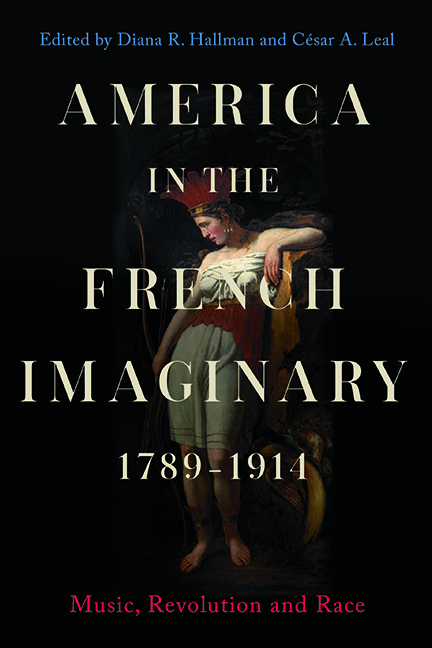Book contents
- Frontmatter
- Dedication
- Contents
- List of Illustrations
- List of Music Examples
- List of Abbreviations
- Editorial Notes
- List of Contributors
- Acknowledgements
- Preface
- Introduction
- Part I American liberté, sauvagerie and esclavage
- Part II Myths of America and Intersecting Identities
- Part III Soundscapes and Sonic Fantasies
- Part IV America, Commodification and Race at the fin de siècle
- Bibliography
- Index
- Music in Society and Culture
7 - Historical Acoustemology in the French Romantic Travelogue: Chateaubriand’s Sonic Imagining of the New World
Published online by Cambridge University Press: 15 September 2022
- Frontmatter
- Dedication
- Contents
- List of Illustrations
- List of Music Examples
- List of Abbreviations
- Editorial Notes
- List of Contributors
- Acknowledgements
- Preface
- Introduction
- Part I American liberté, sauvagerie and esclavage
- Part II Myths of America and Intersecting Identities
- Part III Soundscapes and Sonic Fantasies
- Part IV America, Commodification and Race at the fin de siècle
- Bibliography
- Index
- Music in Society and Culture
Summary
The grave of the writer François-René de Chateaubriand sits dramatically outside the granite walls of the port city of Saint-Malo in Brittany, facing the sea on a nearby island only accessible at low tide. Home to famous explorers such as Jacques Cartier, Saint-Malo is where, as a lonely child, Chateaubriand dreamt of escaping and pursuing life of travel and adventure, inspired by his father's experiences as a sea captain and slave trader. He would eventually become enormously influential in France as a founder of literary Romanticism whose fiction, historical works, and political essays reflected a restless spirit and thirst for novelty. Chateaubriand would become well known for his first-hand accounts of travels in Spain, Italy, Greece, and the Middle East. But his first major voyage was undertaken when he was still a very young man. As the Revolution had begun to upend his country as well as his noble family, Chateaubriand, only twenty-two years old, sailed for North America.
When he embarked on his trip to the New World, Chateaubriand was an unpublished writer with ambitious plans to achieve quick and lasting fame through exploration and the written word. He writes of the circumstances that led to his trip: despite his parents’ wishes that he pursue a career either in the Navy or the Church, in 1790 he was an infantry second lieutenant in the royalist Navarre regiment. He writes about the privilege of being able, as a parti-san of absolute monarchy, to indulge in this ‘voluntary exile’ into a republican world which he claimed was a source of great curiosity and admiration for him as a young man. In his memoir he recalls,
In 1790 I found myself relieved of my duties […] the revolution was proceeding rapidly: the principles on which it was founded were mine, but I detested the violence that had already dishonoured it. It was joyfully that I set out to see an independence more in conformity with my tastes, more in sympathy with my character.
Chateaubriand's motivation for travel went well beyond the practical; he imagined the trip might transform him into an explorer, later writing of his plan to discover the Northwest Passage during his journey.
- Type
- Chapter
- Information
- America in the French Imaginary, 1789-1914Music, Revolution and Race, pp. 217 - 232Publisher: Boydell & BrewerPrint publication year: 2022



